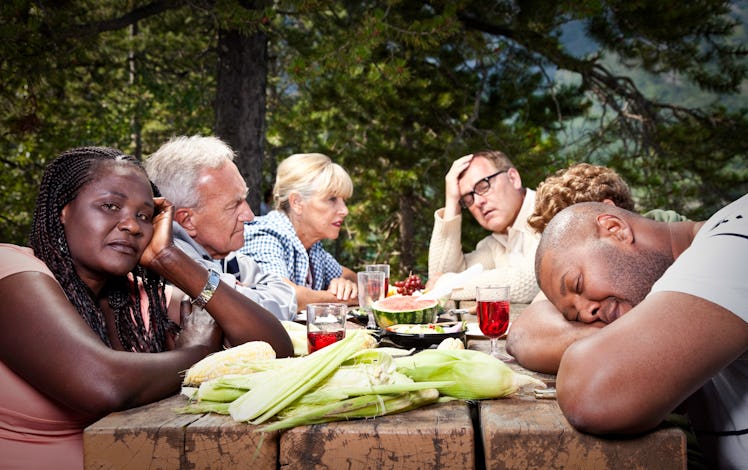How to Deal With In-Laws You Hate
Do you hate your in-laws? There's still hope. Here's how to maintain your sanity and your marriage.

We all know the saying, “When you marry someone, you marry their family, too.” Sometimes that works out for the better, and sometimes for the worse. According to our 2016 In-Laws Survey, around 96 percent (!) of men experienced at least some amount of negative stress in their relationships with their in-laws. If you’re one of the lucky 4 percent who can’t wait to spend the day furniture shopping with your mother-in-law and call your father-in-law “Dad,” then this doesn’t apply to you. But for everyone else, there’s hope to maintain your sanity and your marriage, even if you want to force-feed your in-laws a fist sandwich. Because according to the experts, it doesn’t have to be this way.
According to Dr. Terri Apter, resident scientist and professor at Cambridge University and author of What Do You Want From Me? Learning to Get Along With In-Laws, the biggest challenge when it comes to having a good relationship with in-laws is creating it, because the different relationships you’ve already established with the same person — your significant other, and their child — get in the way.
“The person who joins a new, overlapping family when they marry hopes that they’ll be forming their own family, that they’ll be negotiating mutual respect and mutual status with a partner, and that they will have a direct line of influence on their partner,” Apter says. “What people often discover when they marry is that their in-laws challenge this closeness, this status, and this influence.”
That’s because from an in-law’s perspective, there are things that need to be challenged. Yes, that means your in-laws are testing you. And you feel it. “From a parent-in-law’s perspective, they must ask questions such as, ‘Will this person love and support and care for my son or daughter in the right ways?’ ‘Will my own status in the family be threatened?’ and ‘Will my relationship with my own child have to change?’” explains Apter.
So what should be a relationship suddenly feels like a competition, and any chance at a healthy relationship with your in-laws can feel doomed. But by knowing this, you can turn it around before it heads south. Getting your relationship with your in-laws to a healthy place requires knowing (and acknowledging) that all in-law relationships are rooted in competition for your own individual positions of power within the two different families you each have with that lucky person who happens to be your significant other.
“My best advice is to address the fears of being marginalized or excluded or criticized that underlie the problems,” Apter says. “You can reassure your in-laws that family connections will continue even as marriage changes kinship patterns. You can show that you value what an in-law brings to the family. You can show you want to learn who they are, and in that way you give the message that you welcome them — that you are not threatened by them.”
That means it’s your job to turn competition into collaboration if you don’t want to hate your in-laws.
Aside from being encouraging of their role in their family and yours, being honest, and showing interest in learning who your in-laws are and what you can learn from them, the most important thing you can do to keep your relationship with them in line is to establish boundaries. As it turns out, in-laws don’t need to feel included on everything as long as they don’t feel excluded from anything.
“Keep in mind that a parent’s biggest fear is exclusion from a valued relationship with his or her child and grandchild,” Apter says. “Sometimes people who feel under threat behave badly, so the best approach is to offer reassurance of continuing connection in the context of setting boundaries.” It’s easier to hear “That’s not a good time to visit” or “We’re going to make this decision ourselves” if you’re not afraid of being totally cut off.
Not everyone is going to look forward to interacting with in-laws, but the hope is that you never have to dread it. So if encouraging closeness and seeking the opportunity to bond isn’t your thing, the least you can do is not make it worse. According to Apter, the biggest mistakes you can make with your in-laws are: Assuming you can ignore your in-laws’ wishes and needs completely, asking the son/daughter to choose between his/her parent and you, and trying to sustain your own power by putting down your in-law.
So wherever you stand with your in-laws now, know it can always be better — but it’s going to take some initiative (and understanding) on your end. Odds are, though, if you give it, you’ll get it right back.
How to Deal With In-Laws You Hate: A Cheat Sheet
- The best thing you can do to make a bad in-law relationship better is to show appreciation and offer reassurance while setting boundaries.
- The biggest mistake you can make with your in-laws is assuming that you can ignore their wishes completely.
- Never ask your significant other to choose between you and his/her parents.
- Turn that naturally occurring competition into collaboration.